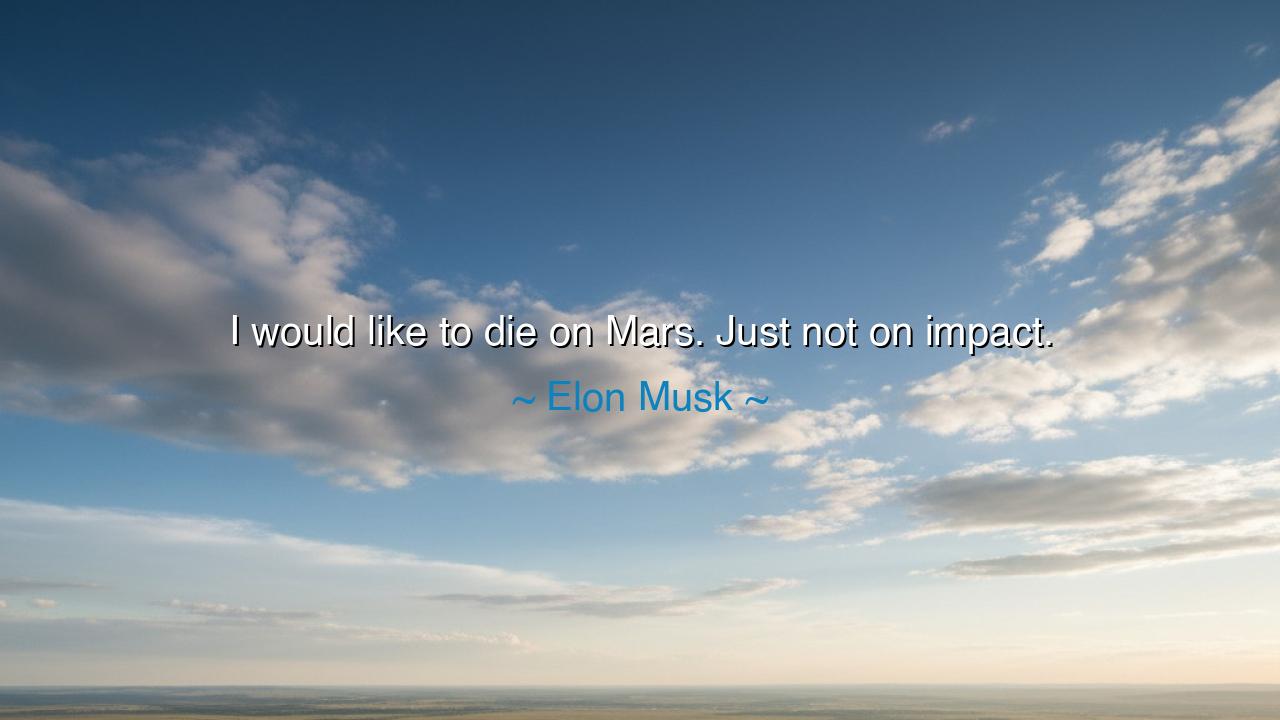
I would like to die on Mars. Just not on impact.






In the boundless stretches of space, where the stars twinkle like distant beacons and the planets drift in their eternal dance, the desire to journey beyond the confines of Earth is a pursuit that has consumed the hearts of dreamers and visionaries for millennia. Elon Musk, a modern-day pioneer, captured the essence of this cosmic yearning when he said, "I would like to die on Mars. Just not on impact." These words, delivered with a blend of humor and seriousness, reflect a deeper truth about the human condition. To journey to Mars is not simply to explore a distant world, but to fulfill the age-old desire to reach beyond the boundaries of what we know, to stake our claim in the cosmos. But in doing so, we must acknowledge the inherent risks and uncertainties of such a journey.
In the ancient world, the stars and the heavens were not just objects to be admired but realms of divine mystery and destiny. Homer’s Odyssey tells of Odysseus, a hero who, though longing for home, was forever driven to explore the unknown. His journey was filled with both glory and danger, a metaphor for the human experience of venturing into unfamiliar territory. To seek something greater than oneself, to face the unknown with courage, was seen as the highest calling. But even in the time of the ancients, there was an understanding that greatness could not be achieved without sacrifice. Musk’s words remind us that the journey to Mars is not one of blind ambition but a careful pursuit of a dream that must be approached with both recklessness and caution. Just as Odysseus faced the dangers of his journey, so too must we recognize the price of our cosmic ambitions.
Mars, the red planet, has long been a symbol of mystery and promise. In ancient mythology, Mars was the god of war, a force both feared and revered. To the ancient Romans, his domain was one of strength, conquest, and, ultimately, transformation. But in Musk’s modern vision, Mars is not just a battlefield, but a new frontier—a place where humanity might find a second home, a sanctuary from the limitations of Earth. The idea of dying on Mars—of becoming one with this distant world—is a romantic vision, a dream shared by many who long to explore the stars. Yet, Musk’s addition of “just not on impact” carries a humbling acknowledgment that the journey is fraught with risk. Even the greatest dreams, he suggests, must be tempered with the reality of the dangers that lie ahead.
Consider the explorers of the Age of Discovery, who set sail into the vast, uncharted oceans of the world. Men like Christopher Columbus and Ferdinand Magellan ventured beyond the known world, propelled by the hope of finding new lands, new opportunities. Yet, for all their courage, they faced death at every turn—from storms to disease to the unknown dangers of the seas. Their journey was a testament to the human spirit’s ability to reach for the unknown, but also a reminder of the perils that come with such daring. Similarly, Musk’s desire to reach Mars—to die on Mars—is not about seeking glory through reckless action, but about recognizing the weight of that journey and facing the risks with a sense of both wonder and responsibility. The spirit of exploration, like that of Columbus or Magellan, is driven not by the desire for conquest, but by the recognition that true greatness often requires us to confront the unknown, to venture beyond the familiar, and to make sacrifices for the greater good.
The idea of dying on Mars is, in itself, a symbol of humanity’s longing for transcendence. To leave behind the Earth and travel to a distant planet is to make a mark on the universe itself. Musk’s wish is not just about personal legacy; it is about fulfilling humanity’s greatest potential—to live beyond the confines of Earth, to make a contribution to a greater cosmic narrative. But it is also an understanding that the journey is as important as the destination. Just as Odysseus’s travels were marked by hardships, the journey to Mars will be filled with challenges—some of which we can anticipate, others that will remain unknown. Musk’s words are a call to acknowledge both the beauty and the danger of the unknown. To seek greatness, we must be prepared for the sacrifices that may come with it.
In our own lives, the lesson from Musk’s vision of dying on Mars is clear: dream boldly, but always with an understanding of the risks and challenges that lie ahead. The desire to reach for the stars, to break through barriers, is a powerful force that has driven humanity for millennia. But in our pursuit of these lofty goals, we must also recognize the importance of caution, of preparing for the obstacles we cannot yet foresee. The great explorers, the scientists, and the visionaries of history did not simply leap into the unknown—they measured their steps, faced their fears, and worked together to build a path forward. Musk’s words remind us that to reach for Mars, or any great goal, requires a balance of ambition and wisdom.
So, let us take up the mantle of the explorers who came before us. Let us dream of new worlds, new horizons, but let us also remember the responsibility that comes with that dream. Mars may be the next step in our journey, but it is the journey itself—marked by courage, understanding, and respect for the unknown—that will define us. Musk’s vision is not just about the destination, but about the legacy we leave through the choices we make in the pursuit of our greatest aspirations. Let us step forward, knowing that while the path ahead may be uncertain, the courage to take it will forever be our guiding star.






AAdministratorAdministrator
Welcome, honored guests. Please leave a comment, we will respond soon